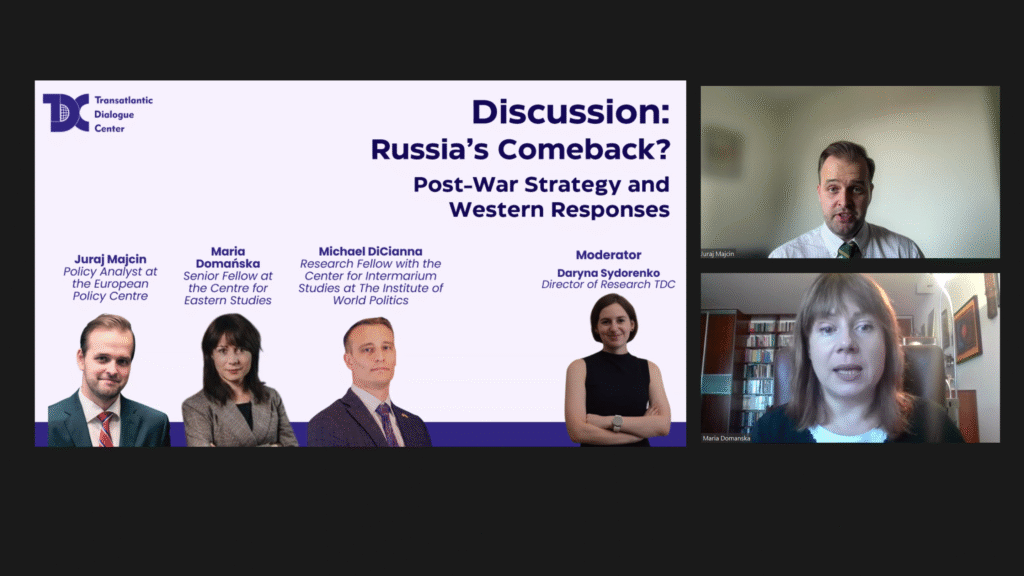On 13 May 2025, the Transatlantic Dialogue Center proudly presented its key research findings on “Russia’s Role in the Post-War World Order.” This presentation framed a vital discussion with distinguished experts on the complex challenges and strategic dilemmas posed by Russia in the evolving global landscape. Our research delved into what a post-war Russia might look like and how Ukraine and the West should prepare. The findings, presented by TDC Director of Research Daryna Sydorenko, suggest that post-war Russia is poised to remain aggressive, irrespective of battlefield outcomes, due to its entrenched ideology, cultivation of aggressive nationalism, and societal unwillingness to compromise. Furthermore, Russia’s militarized economy fuels this aggression, making continued and well-enforced sanctions crucial.
Following the presentation of our core conclusions, our esteemed panelists shared their in-depth perspectives:
Dr. Maria Domańska, Senior Fellow at the Warsaw-based Center for Eastern Studies (OSW): Dr. Domańska argued that under Putinism, war has tragically become a “natural condition of the Russian state,” serving as a tool to guarantee domestic political legitimacy for a regime unable to produce sustainable economic growth. Dr. Domańska highlighted that Putin has made himself a hostage to the war, having invested too much in the idea of an ultimate Russian victory. She made a striking comparison, suggesting that contemporary Russia resembles Nazi Germany more than the Soviet Union due to its revanchism, militarism, and the absence of an “anti-war vaccine” in the public consciousness. Unlike the Soviet Union, Russia is a personalized dictatorship without institutional checks against the leader’s arbitrary will. Dr. Domańska concluded that Russia will remain an existential threat to Europe as long as it remains authoritarian and imperial, and any future normalization of relations with the West must be conditioned not only on Ukraine’s territorial integrity and reparations but critically on domestic liberalization within Russia, including the release of political prisoners and competitive elections.

Juraj Majcin, Policy Analyst at the European Policy Center in Brussels: Mr. Majcin acknowledged a growing realization within Brussels that Russia will remain an existential threat to Europe. However, he cautioned that Europe’s current approach is often too reactive and advocated for a more proactive strategy based on the containment of Russia. A significant part of this strategy, according to Mr. Majcin, must be strong deterrence, though he noted the challenge posed by Russia’s war economy outproducing the West in certain military hardware. He emphasized the importance of supporting EU partner countries like Moldova and Georgia and ensuring democracy thrives in Ukraine. Mr. Majcin also pointed to the different threat perceptions across Europe as a key challenge, stressing the need to reconcile these views and persuade citizens of the necessity for sacrifices for collective security, potentially drawing inspiration from Nordic models of societal involvement. He also touched upon the complexities of EU decision-making, such as achieving unity on sanctions when some member states act as “Trojan horses”.
Michael DiCianna, Research Fellow with the Center for Intermarium Studies at the Institute of World Politics: Mr. DiCianna provided a U.S. perspective, noting that the effort to normalize relations with Russia is a recurring theme across multiple American administrations, including the first Trump term. He suggested that there are signs Donald Trump is beginning to realize that the Putin of 2025 is not the same leader he previously engaged with. Mr. DiCianna highlighted that the Trump administration tends to view American power and alliances, including NATO, primarily through an economic and trade lens, rather than purely military-strategic terms. Criticisms of NATO members often stem from unmet defense spending targets, which are seen as an economic issue. He expressed concern that conventional deterrence might be failing with Russia, as Moscow may perceive itself as already being in a state of war with NATO, not just Ukraine. Mr. DiCianna argued that Russia might be past the point of being deterred by a show of arms if it sees cracks in Western resolve, potentially leading it to “roll the iron dice” and test NATO. He urged a move beyond simply discussing deterrence to developing more serious war plans and for Western liberal democracies to recognize Russia not just as an adversary or competitor, but as an “enemy”.
We extend our sincere gratitude to our distinguished speakers for their invaluable insights and to our engaged audience for their thoughtful questions. This discussion has underscored the vital need for continued dialogue, robust preparedness, and clear-eyed strategies in navigating the complexities of the post-war world order.